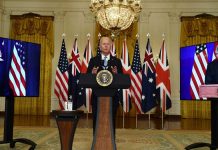The final results of the Norwegian general elections, which took place on Monday, resulted in a decisive victory for the left and center-left camps, while the right and center-right camps suffered a catastrophic loss.
According to the final results that appeared at dawn today, Tuesday, the “Red-Green” camp made great progress by obtaining 100 seats out of 169 in the Norwegian Parliament, as the “Labour” party led by Jonas Gahr Stora (61 years), won 48 seats after winning. With more than 26% of the vote, Stora could head a new government.
For its part, the head of the right-wing coalition government, Erna Solberg, admitted the defeat of her “Blue” camp, after it won 68 seats, putting it far from achieving the support of 85 parliamentarians for its continuation in power.
This exit is considered a great defeat for the right-wing parties after 8 years of rule, and a great success for the left parties, especially the Socialist Left Party, which achieved a result of 7.5% and won 13 seats, and Al-Ahmar (the far left), which achieved a victory of 4.7% by 8 Seats, in an unprecedented result for this party, which has repeatedly attempted to storm Parliament since 2005.
The leader of the “Red” party, Bjornard Moxness, considered that the election result means “the end of the policy of the rule of billionaires and the beginning of the fight against social inequality,” vowing “neoliberalism is approaching its end in the country.”
The results showed that the “center-left” party also achieved more than 3% progress over the 2017 elections, which gave it the second place after the “Social Democratic Party” (Labour) with 18 seats, which puts the bulk of it on it to achieve consensus with “” The Socialist Left to support a coalition government led by the Democratic Party.
The issues of the environment, climate, tax and corona played a major role in determining the direction of Norwegian voters in 19 electoral districts towards voting to the left. Although the threshold in the electoral system requires obtaining 4% of the voter’s vote (for representation by four representatives), the system depends on equal opportunities between parties, as it grants the surplus votes to the party that obtained 3.9% to be able to be represented in two seats, and if it obtains 4.1% It grants between 6 and 8 deputies, which favored small parties, including the “Green” party, which achieved 3.8%. Despite this, the equal opportunity system enabled it to obtain representation with 3 deputies.
And the center-left leader, Stora, went to the elections, yesterday, Monday, with a lower ceiling than what his party achieved in 2017 (27%), considering that it would be a victory if the party achieved a result of 17%, and despite that came the successive crises of the conservative right government, including Corona. The popular interest in climate change and tax issues affected the popularity of the left and center-left camps. His camp achieved a better result than what I expected until polls gave him nearly 92 seats, while he achieved 100 seats.
In his first comment on the election result, Stora said the results “show that the Norwegian people want a more equitable society,” vowing to impose a tax policy that is “fair and in the interest of ordinary people.”
This point, along with vital issues, is a decisive axis in choosing the left camp’s support for a government headed by Jonas Gahr Stora, especially those related to raising the tax rate on the wealthiest classes to which Stora originally belongs, who is classified as one of the millionaires thanks to his affiliation with the business class. It is locally called the “Social Democratic Millionaire”.
Commenting on the election results, Conservative Prime Minister Erna Solberg, who has been in power since 2013, considered that the people had chosen by a clear majority to change the form of government in the country, after her Huwera party (the right) declined from 25% to about 20%.
The result showed that the far-right party “Progress” declined significantly since it achieved the largest result in 2009 by about 23%, to about 11% in Monday’s elections.
Stora: The results show that the Norwegian people want a more equitable society
This ultra-nationalist party has caused successive crises for the government due to its intransigence in positions related to Muslims, the latest of which was its withdrawal from the ruling coalition in the fall of 2020 against the background of Oslo allowing Norwegian women affiliated with ISIS and detained in Syria to return to their country with their children.
Left and center contrast
Except for the outcome of the elections, Norway experimented with a ruling coalition between the “green – red” camp in the period between 2005 and 2013 under Prime Minister Jens Stoltenberg, who is currently the Secretary-General of the North Atlantic Treaty Organization (NATO), during which period was characterized by the opposition of the parties of that camp. What enabled the right to win and rule the country for 8 years.
But it seems that the camp has drawn from its previous experiences, as analysts in electoral affairs believe that all the challenges that the country has experienced, raising awareness and the need to implement equality and social justice among the people, will push this coalition towards settlements that implement the promises of “radical change”, a coalition that is expected to form Its sides are the “social-democratic” (labour), the “center” and the “socialist left”.
This victory does not mean that political turmoil will not appear in the political life in Oslo, especially with regard to the conflict of demands stressed by the “Socialists” and “Greens” with the “Social Democrat”, and specifically about those demands that Norway stop drilling for more oil and gas in a way. Tam, as opposed to turning towards alternative energy sources, in a country that is the largest in Western Europe in terms of energy production.
In addition, the issue of imposing more taxes on high-income earners, which the left insists on, arises, along with its demand with the “greens” to impose a threefold tax on carbon dioxide.
As for foreign policy, the contradiction is clear in terms of the “left”‘s opposition to their country’s membership in “NATO”, as well as the demands that it stop cooperation with the European Union (which is not a member of it), and replace it with bilateral agreements between countries, which is opposed by the center left, which believes that Oslo’s cooperation with the European camp brings the country many benefits related to the open market.





